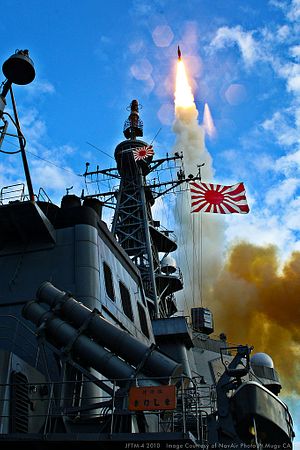Japan withdrew from an international fleet review hosted by South Korea after Tokyo refused to accept Seoul’s demands not to hoist the “rising sun” flag. The episode reflects another flare-up in the bilateral relationship related to wartime history, even as leaders on both sides have attempted to improve ties this year.
A ship from Japan’s Maritime Self-Defense Force (JMSDF) was due to participate in the fleet review on South Korea’s southern island of Jeju. Overall, the event from October 10 to 14 was expected to attract warships from about a dozen countries, including from the United States and Russia.
The host country asked the JMSDF to refrain from flying the “rising sun” flag, which is viewed on the Korean Peninsula as a symbol of Japan’s imperialistic past. Japan ruled the Korean Peninsula from 1910 to 1945.
Instead, South Korea encouraged the participating countries to display their national flags plus the South Korean flag. Japan’s national flag features a simple red sun on a plain white background.
But Japanese officials, including the then-defense minister, Itsunori Onodera, had insisted that the rising sun was the country’s recognized naval ensign and that it should be displayed.
Onodera, speaking a few days before he was replaced in a cabinet reshuffle on October 2, said: “As we are required to hoist the ensign of self-defense in accordance with domestic laws, and deem that this ensign corresponds with the external markers that indicate the nationality of a ship that belongs to the military force of a country under the UN Convention on the Law of the Sea, we will, of course, hoist the ensign of self-defense.”
In his press conference, Onodera added that the design was “used widely in Japan as a flag used by fishermen to indicate a good fishing haul as well as to celebrate births and seasonal festivals.” Japanese media also noted that the rising sun flag was used when naval ships participated in South Korean fleet reviews in 1998 and 2008.
South Korea is understood to have raised its concerns through multiple channels. South Korea’s foreign affairs minister, Kang Kyung-wha, said on October 4: “We have conveyed our stance that Japan should sufficiently consider our people’s sentiment toward the rising sun flag and our historical experience.”
Incidentally, North Korean propaganda outlets also joined in the criticism of Japan over the matter, describing it as an “intolerable insult” to the Korean people.
There were suggestions at one point that a compromise might be under consideration to alleviate the diplomatic row. South Korea’s Yonhap news agency reported that an anonymous government source said a Japanese naval ship might arrive at the port with the rising sun flag flying but then use its national flag during the fleet review.
However, the Japanese government ultimately decided not to send a warship to the fleet review. “Unfortunately, we have come to a situation where we have no choice but to pass on our participation in the international fleet review,” Takeshi Iwaya, the new defense minister, said as he announced the decision on October 5. He described the outcome as “regrettable.”
Both sides said the two countries would continue military exchanges along with efforts to strengthen their friendship.
Still, the episode illustrates the lingering distrust arising from historical issues, including the Japanese military’s wartime use of sex slaves, euphemistically referred to as “comfort women.”
Japanese Prime Minister Shinzo Abe had said in a speech at the beginning of this year that he would work with South Korean President Moon Jae-in “to deepen the cooperative relationship between us for a new era with a future-oriented perspective, by building on the international agreements between our two nations and on our mutual trust.”
When the pair met on the sidelines of the United Nations General Assembly in New York last month, Moon reaffirmed that he would not nullify or demand renegotiation of the 2015 bilateral agreement that was intended at the time as the “final and irreversible” resolution of the comfort women issue.
However, Moon also told Abe the Reconciliation and Healing Foundation set up as part of the agreement “was destined to wither as it could not function properly due to opposition from the public and surviving elderly victims of Japanese military sexual slavery.” Japan had previously provided a lump sum contribution to the foundation.
The latest dispute over the rising sun flag roughly coincides with the 20th anniversary of a joint declaration calling for an improvement in relations between Seoul and Tokyo.

































